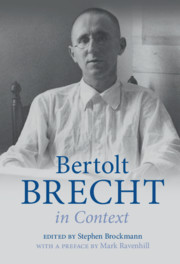Book contents
- Bertolt Brecht in Context
- Bertolt Brecht in Context
- Copyright page
- Contents
- Figure
- Notes on Contributors
- Chronology
- Abbreviations
- Preface
- A Note on Brecht in English
- Introduction
- Part I Brecht’s World
- Part II Brecht’s Work
- Chapter 13 The Work of the Theater
- Chapter 14 Brecht and Marxism
- Chapter 15 Brecht and Photography
- Chapter 16 Brecht and Film: Medium and Masses
- Chapter 17 Brecht and Fiction
- Chapter 18 Gestus in Context
- Chapter 19 Brecht’s Ethics
- Chapter 20 Brecht and Dialectics
- Chapter 21 Brecht and East Asia
- Chapter 22 Brecht’s Work with Musical Composers
- Part III The World’s Brecht
- Concise Bibliography
- Index
Chapter 17 - Brecht and Fiction
from Part II - Brecht’s Work
Published online by Cambridge University Press: 28 May 2021
- Bertolt Brecht in Context
- Bertolt Brecht in Context
- Copyright page
- Contents
- Figure
- Notes on Contributors
- Chronology
- Abbreviations
- Preface
- A Note on Brecht in English
- Introduction
- Part I Brecht’s World
- Part II Brecht’s Work
- Chapter 13 The Work of the Theater
- Chapter 14 Brecht and Marxism
- Chapter 15 Brecht and Photography
- Chapter 16 Brecht and Film: Medium and Masses
- Chapter 17 Brecht and Fiction
- Chapter 18 Gestus in Context
- Chapter 19 Brecht’s Ethics
- Chapter 20 Brecht and Dialectics
- Chapter 21 Brecht and East Asia
- Chapter 22 Brecht’s Work with Musical Composers
- Part III The World’s Brecht
- Concise Bibliography
- Index
Summary
This chapter is divided into three sections examining Brecht’s literary influences, his achievements as a writer of fiction, and his legacy. It considers Brecht’s admiration for prose writers including Döblin, Büchner, Grimmelshausen, Wodehouse, Kipling, and Hašek. It argues that these readings, alongside Brecht’s interest in Nietzsche and the Vienna Circle, helped to inform his understanding of language as a form of practical intervention. Brecht sees language as a rhetorical tool kit, a “handle” that can be used to change reality. The chapter also argues that Brecht’s fiction is characterized by “blunt thinking,” employed as a means of ideological critique. This is shown by a consideration of Brecht’s two masterworks of short philosophical fiction, Stories of Mr. Keuner and Refugee Conversations, and his three experimental novels, Threepenny Novel, the Tui-Novel, and The Business Affairs of Mr. Julius Caesar. The chapter concludes with some brief observations about Brecht’s enduring significance for German prose fiction from the mid-twentieth century until the present day, also noting his influence on the Kenyan writer Ngũgĩ wa Thiong’o.
Keywords
Information
- Type
- Chapter
- Information
- Bertolt Brecht in Context , pp. 149 - 157Publisher: Cambridge University PressPrint publication year: 2021
